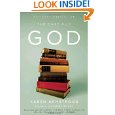We know very little about the historical Jesus, since all our information comes from the texts of the New Testament, which were not primarily concerned with factual accuracy. (Karen Armstrong on p. 81 of The Case for God.)
 In my last post, I summarized Karen Armstrong’s view of God and religion. One item that was of particular interest to me was her view of Jesus Christ. No other religion in her book gets the debunking she gives Christianity. (This also serves as a sort of counter point to the Believing Scholars point of view as discussed here.)
In my last post, I summarized Karen Armstrong’s view of God and religion. One item that was of particular interest to me was her view of Jesus Christ. No other religion in her book gets the debunking she gives Christianity. (This also serves as a sort of counter point to the Believing Scholars point of view as discussed here.)
In her view, Jesus, for reasons lost in history, was crucified by the Romans only to have his disciples have “visions” that convinced them he had been raised from the dead. (p. 82) The first Christians were, of course, thoroughly Jewish which she believes had no intentions of founding a new religion, though she admits they took the “highly unusual” step of converting gentiles. (p. 82) This eventually lead to Paul (and probably others) belief that the mixed Jewish and Gentile congregations were the first fruits of a “new Israel.” Using Midrashic techniques, these early Christians reinterpreted the Old Testament to contain prophecies — never originally intended — of a future redeemer who would be crucified and rise from the dead. She uses 1 Cor 1:23 to prove that these reinterpretations were often considered scandalous. Continue reading
